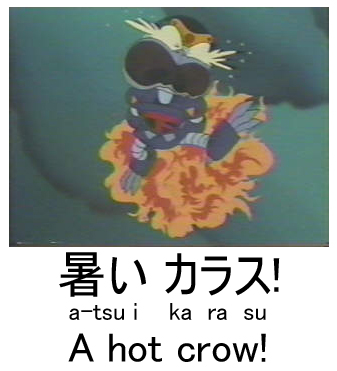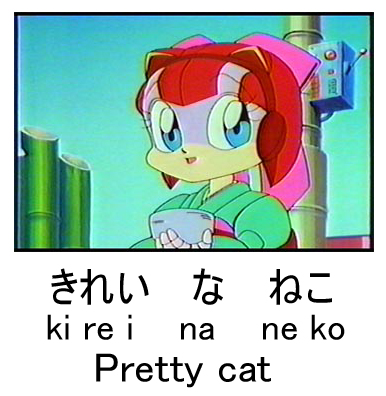Lesson 16: "Adjectives"
 In case you didn't pay attention in school, an adjective is a word that describes a noun. Japanese adjectives have different ending that can effect the meanings, similar to the way Japanese verbs work. There are two types of adjectives in Japanese, the first type is called an "i" adjective (remember, in Japanese that "i" is pronounced "ee"!) because they always end with a vowel and "-i" (-ai, -ii, -oi, -ui). All "i" adjectives end with "-i", but not all adjectives that end with "-i" are "i" adjectives*! Adjectives ending with a consonant and an "i", or with "-ei", are not "i" adjectives. More about this later in this lesson. You've already learned some of these, like "Ii" (Good), "Warui" (Bad), and "Oishii" (delicious). Some other examples of adjectives with the "-i" ending are "Okii" (oh-kee) "Big", and "Chisai" (chee-sai) "Small". "Atsui" (Ahtsu-ee) is "hot", and there are 2 different ways to say "cold", "Samui" (Sah-mu-ee) means "cold" when referring to the weather or surrounding atmosphere, and "Tsumetai" means "cold" when referring to something you can touch, like an ice cube. "Furui" (Fu-ru-ee) "Old" and "Atarashii" (Ah-tah-rah-shee) "New". Of course, there are plenty more adjectives, but this lesson is just an introduction to Japanese adjectives, we're not going to try and learn them all at once! For now, let's try some of these out:
In case you didn't pay attention in school, an adjective is a word that describes a noun. Japanese adjectives have different ending that can effect the meanings, similar to the way Japanese verbs work. There are two types of adjectives in Japanese, the first type is called an "i" adjective (remember, in Japanese that "i" is pronounced "ee"!) because they always end with a vowel and "-i" (-ai, -ii, -oi, -ui). All "i" adjectives end with "-i", but not all adjectives that end with "-i" are "i" adjectives*! Adjectives ending with a consonant and an "i", or with "-ei", are not "i" adjectives. More about this later in this lesson. You've already learned some of these, like "Ii" (Good), "Warui" (Bad), and "Oishii" (delicious). Some other examples of adjectives with the "-i" ending are "Okii" (oh-kee) "Big", and "Chisai" (chee-sai) "Small". "Atsui" (Ahtsu-ee) is "hot", and there are 2 different ways to say "cold", "Samui" (Sah-mu-ee) means "cold" when referring to the weather or surrounding atmosphere, and "Tsumetai" means "cold" when referring to something you can touch, like an ice cube. "Furui" (Fu-ru-ee) "Old" and "Atarashii" (Ah-tah-rah-shee) "New". Of course, there are plenty more adjectives, but this lesson is just an introduction to Japanese adjectives, we're not going to try and learn them all at once! For now, let's try some of these out:
Okii piza (oh-kee pee-zah) = Big pizza
Chisai des' (chee-sai des) = It's small
Atsui ocha (Ahtsu-ii oh-chah) = Hot tea
Kyo wa samui des' ka? (Kyoh wah sah-mu-ee des kah) Is it cold today?
Aisu kurimu wa tsumetai des'. (ai-su ku-ree-mu wah su-meh-tai des) = Ice cream is cold.
Kore wa furui des'. (koh-reh wah fu-ru-ee des) This is old.
Sore wa atarashii des'. (Soh-reh wah ah-tah-rah-shee des) = That is new.
You can change the "-i" type adjectives to a negative by taking off the last "-i" and adding "-kunai". This ending is actually made up from 2 parts. "Ku" shows that the word in front of it is an adjective, the "nai" makes it a negative. To make it past tense, add "katta". It's sort of like saying "was" instead of "is". You can make it past tense and negative by using "kuna katta", that's a combination of "ku na(i)+katta". Here are some examples:
Oishii piza = "delicious pizza"
Pizza wa oishii des'. = "The pizza is delicious."
Pizza wa oishi-kunai des'. = "The pizza is not delicious."
Pizza wa oishi-katta des'. = "The pizza was delicious."
Pizza wa oishi-kuna-katta des'. = "The pizza was not delicious."
The second type of adjective used in Japanese are called "na" adjectives**. These are basically every adjective that isn't an "-i" adjective. When these adjectives are used to describe a noun, "na" is used like a particle. You know the word "Suki" means "Like" (Watashi wa sushi ga suki! = I like sushi), by adding "na", "suki" becomes an adjective, changing "Suki" to "Suki na", which means "Favorite". "Suki na kimono" = "Favorite kimono". Suki ends with "i", but it doesn't have another vowel before the "i", so it's a "na" adjective. "Kirei" (kee-rehee) = Pretty/beautiful, it ends with "-ei", so it's a "na" too. If you see an adjective like "Baka" (bah-kah) = "Stupid", that doesn't end with "i" at all, you know it has to be a "na" adjective! There are a very few exceptions that really match all the conditions to be an "i" adjective, but are really "na" adjectives, like "Yukai" (you-kai) = "funny/amusing". Since they are fairly rare, you should be able to just remember these exceptions. I hope I haven't confused you! Now that you can spot a "na" adjective, lets learn how to use them! We'll practice with the adjective "Rippa" (reep-pah) = "Great/wonderful":
 Rippa na resutoren = (reep-pah nah reh-su-toh-reh-n) = "Great restaurant" (when you are using a "na" adjective before a noun, you add "na" between them. That's why we call them "na" adjectives!)
Rippa na resutoren = (reep-pah nah reh-su-toh-reh-n) = "Great restaurant" (when you are using a "na" adjective before a noun, you add "na" between them. That's why we call them "na" adjectives!)
Resutoren wa rippa des'. (reh-su-toh-reh-n wah reep-pah des) = "The restaurant is great." ("Rippa" doesn't have a noun after it now, so you don't need to add anything. Easy!)
Resutoren wa rippa dewa arimasen. (reh-su-toh-reh-n wah reep-pah deh-wah ah-ree-mah-sen) = "The restaurant is not great."
Resutoren wa rippa deshita. (reh-su-toh-reh-n wah reep-pah deh-shee-tah) = "The restaurant was great."
Resutoren wa rippa dewa arimasen deshita. (reh-su-toh-reh-n wah reep-pah deh-wah ah-ree-mah-sen deh-shee-tah) = "The restaurant was not great.
When the adjective is right before the noun, it's modifying that noun. "Kirei na kimono" means "Pretty kimono" and "Kimono wa kirei des'." means "The kimono is pretty."
Remember, the best way to learn Japanese is to listen to it! Go get a Japanese movie and listen for what you've learned while you watch it.
* In Japanese, "i" adjectives are called "keiyoushi"
** In Japanese, "na" adjectives are called "keiyou doushi"
 Rippa na resutoren = (reep-pah nah reh-su-toh-reh-n) = "Great restaurant" (when you are using a "na" adjective before a noun, you add "na" between them. That's why we call them "na" adjectives!)
Rippa na resutoren = (reep-pah nah reh-su-toh-reh-n) = "Great restaurant" (when you are using a "na" adjective before a noun, you add "na" between them. That's why we call them "na" adjectives!) In case you didn't pay attention in school, an adjective is a word that describes a noun. Japanese adjectives have different ending that can effect the meanings, similar to the way Japanese verbs work. There are two types of adjectives in Japanese, the first type is called an "i" adjective (remember, in Japanese that "i" is pronounced "ee"!) because they always end with a vowel and "-i" (-ai, -ii, -oi, -ui). All "i" adjectives end with "-i", but not all adjectives that end with "-i" are "i" adjectives*! Adjectives ending with a consonant and an "i", or with "-ei", are not "i" adjectives. More about this later in this lesson. You've already learned some of these, like "Ii" (Good), "Warui" (Bad), and "Oishii" (delicious). Some other examples of adjectives with the "-i" ending are "Okii" (oh-kee) "Big", and "Chisai" (chee-sai) "Small". "Atsui" (Ahtsu-ee) is "hot", and there are 2 different ways to say "cold", "Samui" (Sah-mu-ee) means "cold" when referring to the weather or surrounding atmosphere, and "Tsumetai" means "cold" when referring to something you can touch, like an ice cube. "Furui" (Fu-ru-ee) "Old" and "Atarashii" (Ah-tah-rah-shee) "New". Of course, there are plenty more adjectives, but this lesson is just an introduction to Japanese adjectives, we're not going to try and learn them all at once! For now, let's try some of these out:
In case you didn't pay attention in school, an adjective is a word that describes a noun. Japanese adjectives have different ending that can effect the meanings, similar to the way Japanese verbs work. There are two types of adjectives in Japanese, the first type is called an "i" adjective (remember, in Japanese that "i" is pronounced "ee"!) because they always end with a vowel and "-i" (-ai, -ii, -oi, -ui). All "i" adjectives end with "-i", but not all adjectives that end with "-i" are "i" adjectives*! Adjectives ending with a consonant and an "i", or with "-ei", are not "i" adjectives. More about this later in this lesson. You've already learned some of these, like "Ii" (Good), "Warui" (Bad), and "Oishii" (delicious). Some other examples of adjectives with the "-i" ending are "Okii" (oh-kee) "Big", and "Chisai" (chee-sai) "Small". "Atsui" (Ahtsu-ee) is "hot", and there are 2 different ways to say "cold", "Samui" (Sah-mu-ee) means "cold" when referring to the weather or surrounding atmosphere, and "Tsumetai" means "cold" when referring to something you can touch, like an ice cube. "Furui" (Fu-ru-ee) "Old" and "Atarashii" (Ah-tah-rah-shee) "New". Of course, there are plenty more adjectives, but this lesson is just an introduction to Japanese adjectives, we're not going to try and learn them all at once! For now, let's try some of these out: